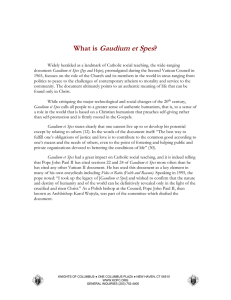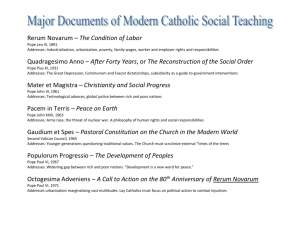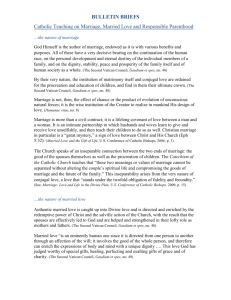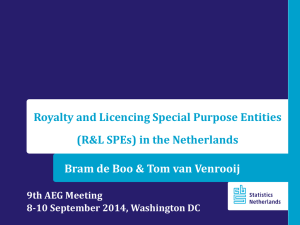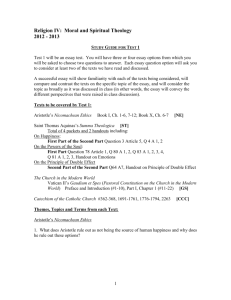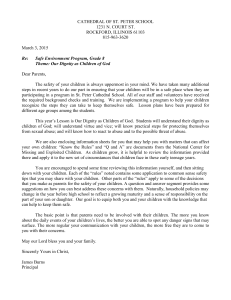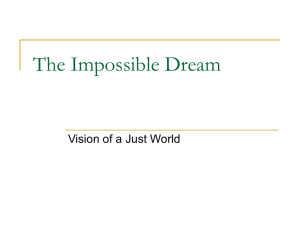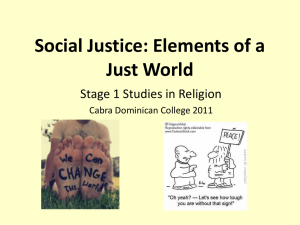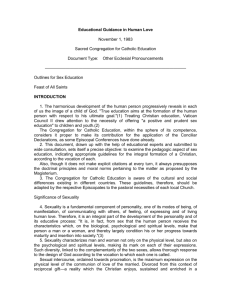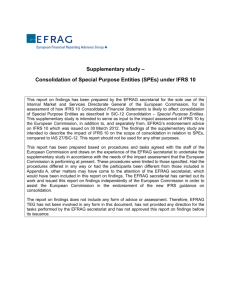Fundamental values of social life
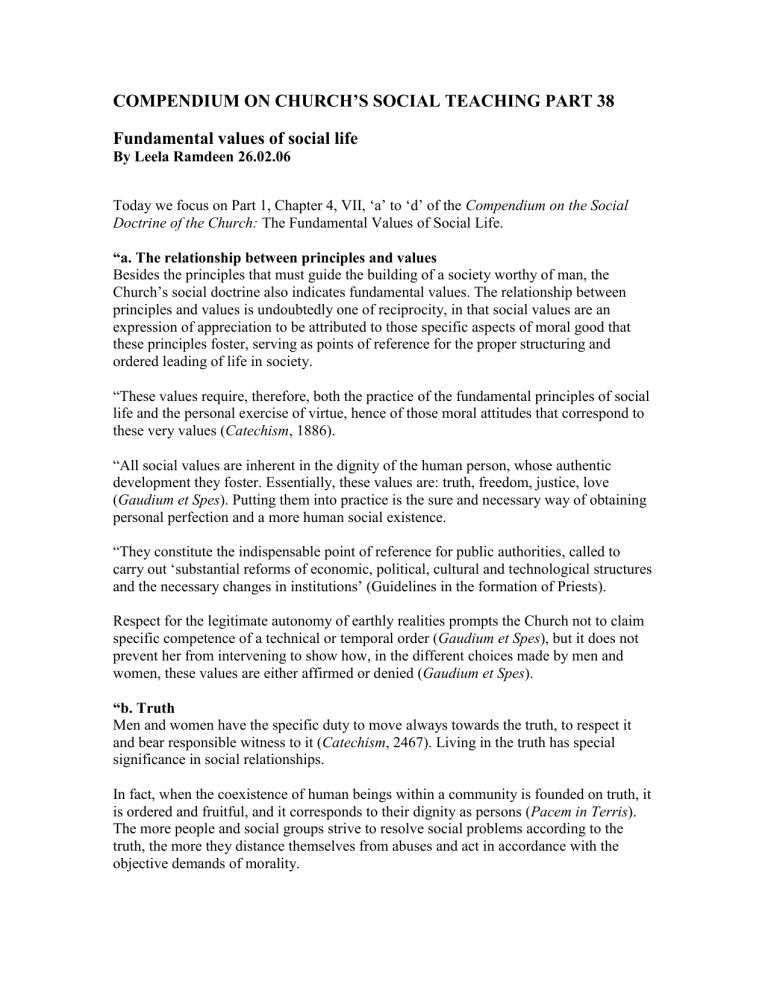
COMPENDIUM ON CHURCH’S SOCIAL TEACHING PART 38
Fundamental values of social life
By Leela Ramdeen 26.02.06
Today we focus on Part 1, Chapter 4, VII, ‘a’ to ‘d’ of the
Compendium on the Social
Doctrine of the Church: The Fundamental Values of Social Life.
“a. The relationship between principles and values
Besides the principles that must guide the building of a society worthy of man, the
Church’s social doctrine also indicates fundamental values. The relationship between principles and values is undoubtedly one of reciprocity, in that social values are an expression of appreciation to be attributed to those specific aspects of moral good that these principles foster, serving as points of reference for the proper structuring and ordered leading of life in society.
“These values require, therefore, both the practice of the fundamental principles of social life and the personal exercise of virtue, hence of those moral attitudes that correspond to these very values ( Catechism , 1886).
“All social values are inherent in the dignity of the human person, whose authentic development they foster. Essentially, these values are: truth, freedom, justice, love
( Gaudium et Spes ). Putting them into practice is the sure and necessary way of obtaining personal perfection and a more human social existence.
“They constitute the indispensable point of reference for public authorities, called to carry out ‘substantial reforms of economic, political, cultural and technological structures and the necessary changes in institutions’ (Guidelines in the formation of Priests).
Respect for the legitimate autonomy of earthly realities prompts the Church not to claim specific competence of a technical or temporal order ( Gaudium et Spes ), but it does not prevent her from intervening to show how, in the different choices made by men and women, these values are either affirmed or denied ( Gaudium et Spes ).
“b. Truth
Men and women have the specific duty to move always towards the truth, to respect it and bear responsible witness to it ( Catechism , 2467). Living in the truth has special significance in social relationships.
In fact, when the coexistence of human beings within a community is founded on truth, it is ordered and fruitful, and it corresponds to their dignity as persons ( Pacem in Terris ).
The more people and social groups strive to resolve social problems according to the truth, the more they distance themselves from abuses and act in accordance with the objective demands of morality.
“Modern times call for an intensive educational effort (
Gaudium et Spes ) and a corresponding commitment on the part of all so that the quest for truth cannot be ascribed to the sum of different opinions, nor to one or another of these opinions – will be encouraged in every sector and will prevail over every attempt to relativise its demands or to offend it ( Gaudium et Spes ).
This is an issue that involves the world of public communications and that of the economy in a particular way. In these areas, the unscrupulous use of money raises ever more pressing questions, which necessarily call for greater transparency and honesty in personal and social activity.
“c. Freedom
Freedom is the highest sign in man of his being made in the divine image and, consequently, is a sign of the sublime dignity of every human person ( Gaudium et Spes ).
‘Freedom is exercised in relationships between human beings.
Every human person, created in the image of God, has the natural right to be recognized as a free and responsible being. All owe to each other the duty of respect. The right to the exercise of freedom, especially in moral and religious matters, is an inalienable requirement of the dignity of the human person’ ( Catechism , 1738).
“The meaning of freedom must not be restricted, considering it from a purely individualistic perspective and reducing it to the arbitrary and uncontrolled exercise of one’s own personal autonomy.
‘Far from being achieved in total self-sufficiency and the absence of relationships, freedom only truly exists where reciprocal bonds, governed by truth and justice, link people to one another’ (
Libertatis Conscientia ). The understanding of freedom becomes deeper and broader when it is defended, even at the social level, in all of its various dimensions.
“The value of freedom, as an expression of the singularity of each human person, is respected when every member of society is permitted to fulfil his personal vocation, to seek the truth and profess his religious, cultural and political ideas; to express his opinions; to choose his state of life, and, as far as possible his line of work; to pursue initiatives of an economic, social or political nature. This must take place within a ‘strong juridical framework’ (
Centesimus Annus ), within the limits imposed by the common good and public order, and, in every case, in a manner characterised by responsibility.
“On the other hand, freedom must also be expressed as the capacity to refuse what is morally negative, in whatever guise it may be presented ( Centesimus Annus ), as the capacity to distance oneself effectively from everything that could hinder personal, family or social growth.
The fullness of freedom consists in the capacity to be in possession of oneself in view of the genuine good within the context of the universal common good ( Pacem in Terris ).
“d. Justice
Justice is a value that accompanies the exercise of the corresponding cardinal moral virtue ( Summa Theologiae
). According to its most classic formulation, it ‘consists in the constant and firm will to give their due to God and neighbour’ (
Catechism , 1807).
From a subjective point of view, justice is translated into behaviour that is based on the will to recognize the other as a person, while from an objective point of view, it constitutes the decisive criteria of morality in the intersubjective and social sphere
( Pacem in Terris ).
“The Church’s social Magisterium constantly calls for the most classical forms of justice to be respected: commutative, distributive and legal justice ( Catechism , 2411). Ever greater importance has been given to social justice ( Catechism , 1928-1942), which represents a real development in general justice, the justice that regulates social relationships according to the criterion of observance of the law. Social justice, a requirement related to the social question which today is worldwide in scope concerns the social, political and economic aspects and, above all, the structural dimension of problems and their respective solutions.
“Justice is particularly important in the present-day context, where the individual value of the person, his dignity and his rights – despite proclaimed intentions – are seriously threatened by the widespread tendency to make exclusive use of criteria of utility and ownership.
Justice, too, on the basis of these criteria, is considered in a reductionist manner, whereas it acquires a fuller and more authentic meaning in Christian anthropology. Justice, in fact, is not merely a simple human convention, because what is ‘just’ is not first determined by the law but by the profound identity of the human being.
“The full truth about man makes it possible to move beyond a contractualistic vision of justice, which is a reductionist vision, and to open up also for justice the new horizon of solidarity and love.’ By itself, justice is not enough. Indeed, it can ever betray itself, unless it is open to that deeper power which is love’ (Pope John Paul II, World Day of
Peace 2004). In fact, the Church’s social doctrine places alongside the value of justice that of solidarity, in that it is the privileged way of peace.
“If peace is the fruit justice, ‘today one would say, with the same exactness and the same power of biblical inspiration (Is 32:17; Jas 3:18): Opus solidaritatis pax , peace as the fruit of solidarity ( Sollicitudo Rei Socialis ).
The goal of peace, in fact, ‘will certainly be achieved through the putting into effect of social and international justice, but also through the practice of the virtues which favour togetherness, and which teach us to live in unity, so as to build in unity, by giving and receiving a new society and a better world ( Sollicitudo Rei Socialis
).”
